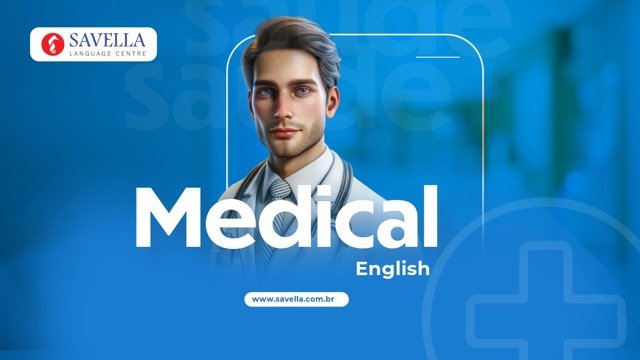Medical English
- Description
- Curriculum
- Reviews
- Grade

-
1Unit 1: Introduction to Medical English
Welcome to Unit 1 of our English for Doctors course. In this unit, we will focus on introducing basic medical English terms and practicing the present simple tense. Our main vocabulary will include fundamental words you will frequently encounter in a medical setting, such as "doctor," "patient," "hospital," "clinic," and "appointment." We will also learn how to use the present simple tense to talk about routine activities and schedules. By the end of this unit, you will be able to effectively communicate basic information and schedule appointments in English.
-
2Vocabulary Test | Medical English Unit 1
-
3Unit 2: Patient History
Welcome to Unit 2 of our English for Doctors course. In this unit, we will focus on taking a patient’s medical history, using the past simple tense, and expanding our vocabulary with terms related to medical history. By the end of this unit, you will be able to ask about and discuss a patient’s past medical experiences effectively.
-
4Vocabulary Test | Medical English Unit 2
-
5Unit 3: Physical Examination
Welcome to Unit 3 of our English for Doctors course. In this unit, we will focus on performing a routine physical examination, using the present continuous tense, and expanding our vocabulary with terms related to body parts and basic examination procedures. By the end of this unit, you will be able to conduct a physical examination and describe what you are doing using the present continuous tense.
-
6Vocabulary Test | Medical English Unit 3
-
7Unit 4: Common Symptoms
Hello, and welcome to Unit 4 of our Medical English course for doctors. In this unit, we will focus on common symptoms that patients often describe when they visit a medical professional. Our grammar point for this unit is modal verbs, such as "can," "could," and "might." These verbs are essential when discussing possibilities, abilities, and suggestions related to medical conditions.
-
8Vocabulary Test | Medical English Unit 4
-
9Unit 5: Medication and Prescriptions
Welcome to Unit 5: Medication and Prescriptions. In this lesson, we will focus on learning how to talk about medications and prescriptions in English. This includes understanding and using relevant vocabulary such as "pill," "tablet," "dosage," "prescription," and "refill." We will also look at how to use imperatives, which are essential for giving instructions related to medication.
-
10Vocabulary Test | Medical Englsih Unit 5
-
13Unit 7: Chronic Diseases
Welcome to Unit 7 of our Medical English course. In this unit, we will focus on chronic diseases. Chronic diseases are long-lasting conditions that usually can be controlled but not cured. It is crucial for medical professionals to understand the terminology associated with these conditions to effectively manage and communicate with patients.
-
14Vocabulary Test | Medical English Unit 7
-
15Unit 8: Diagnostic Tests
Welcome to Unit 8 of our Medical English course. In this unit, we will focus on diagnostic tests. These tests are crucial for identifying and understanding various medical conditions. They help healthcare professionals make accurate diagnoses and create effective treatment plans.
-
16Vocabulary Test | Medical English Unit 8
-
17Unit 9: Surgical Procedures
Welcome to Unit 9 of our Medical English course. In this unit, we will focus on surgical procedures. Understanding the terminology associated with surgeries is essential for medical professionals, as it allows them to communicate effectively with colleagues and patients.
-
18Vocabulary Test | Medical English Unit 9
-
23Unit 12: Obstetrics and Gynecology
Welcome to Unit 12 of our Medical English course. In this unit, we will focus on obstetrics and gynecology, often abbreviated as OB-GYN. This field of medicine deals with pregnancy, childbirth, and the health of the female reproductive system.
-
24Vocabulary Test | Medical English Unit 12
-
25Unit 13: Infectious Diseases
Welcome to Unit 13 of our Medical English course. In this unit, we will focus on infectious diseases. Understanding the terminology associated with infections is essential for diagnosing, treating, and preventing these diseases.
-
26Vocabulary Test | Medical English Unit 13
-
27Unit 14: Mental Health
Welcome to Unit 14 of our Medical English course. In this unit, we will focus on mental health. Understanding the terminology associated with mental health is crucial for diagnosing, treating, and supporting patients with mental health conditions.
-
28Vocabulary Test | Medical English Unit 14
-
29Unit 15: Oncology
Welcome to Unit 15 of our Medical English course. In this unit, we will focus on oncology, which is the study and treatment of cancer. Understanding oncology terminology is essential for diagnosing, treating, and supporting patients with cancer.
-
30Vocabulary Test | Medical English Unit 15
-
31Unit 16: Cardiology
Welcome to Unit 16 of our Medical English course. In this unit, we will focus on cardiology, the branch of medicine that deals with diseases and conditions of the heart and blood vessels. Understanding cardiology terminology is essential for diagnosing, treating, and preventing heart-related illnesses.
-
32Vocabulary Test | Medical English Unit 16
-
33Unit 17: Dermatology
Welcome to Unit 17 of our Medical English course. In this unit, we will focus on dermatology, the branch of medicine dealing with the skin and its diseases. Understanding dermatology terminology is essential for diagnosing, treating, and managing skin conditions.
-
34Vocabulary Test | Medical English Unit 17
-
35Unit 18: Orthopedics
Welcome to Unit 18 of our Medical English course. In this unit, we will focus on orthopedics, the branch of medicine dealing with the musculoskeletal system. Understanding orthopedic terminology is essential for diagnosing, treating, and managing conditions related to bones, joints, and muscles.
-
36Vocabulary Test | Medical English Unit 18
-
37Unit 19: Neurology
Welcome to Unit 19 of our Medical English course. In this unit, we will focus on neurology, the branch of medicine dealing with the nervous system. Understanding neurology terminology is essential for diagnosing, treating, and managing conditions related to the brain, spinal cord, and nerves.
-
38Vocabulary Test | Medical English Unit 19
-
39Unit 20: Endocrinology
Welcome to Unit 20 of our Medical English course. In this unit, we will focus on endocrinology, the branch of medicine dealing with hormones and the endocrine system. Understanding endocrinology terminology is essential for diagnosing, treating, and managing hormonal disorders.
-
40Vocabulary Test | Medical English Unit 20
-
41Unit 21: Respiratory Care
Welcome to Unit 21 of our Medical English course. In this unit, we will focus on respiratory care, which involves the treatment and management of diseases and conditions affecting the respiratory system. Understanding respiratory care terminology is essential for diagnosing, treating, and managing respiratory disorders.
-
42Vocabulary Test | Medical English Unit 21
-
43Unit 22: Gastroenterology
Welcome to Unit 22 of our Medical English course. In this unit, we will focus on gastroenterology, the branch of medicine dealing with the digestive system and its disorders. Understanding gastroenterology terminology is essential for diagnosing, treating, and managing gastrointestinal conditions.
-
44Vocabulary Test | Medical English Unit 22
-
45Unit 23: Urology
Welcome to Unit 23 of our Medical English course. In this unit, we will focus on urology, the branch of medicine dealing with the urinary system and male reproductive organs. Understanding urology terminology is essential for diagnosing, treating, and managing conditions related to these systems.
-
46Vocabulary Test | Medical English Unit 23
-
47Unit 24: Rheumatology
Welcome to Unit 24 of our Medical English course. In this unit, we will focus on rheumatology, the branch of medicine that deals with the diagnosis and treatment of rheumatic diseases. These conditions often involve the joints, muscles, and connective tissues.
-
48Vocabulary Test | Medical English Unit 24




Recent Comments